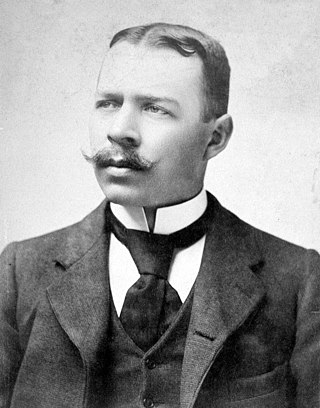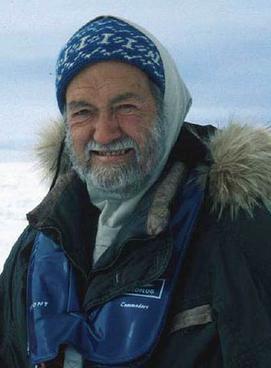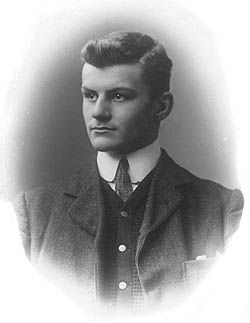
Sir Ernest Henry Shackleton was an Anglo-Irish Antarctic explorer who led three British expeditions to the Antarctic. He was one of the principal figures of the period known as the Heroic Age of Antarctic Exploration.

Sir Wilfred Patrick Thesiger, also known as Mubarak bin Landan was a British military officer, explorer, and writer. Thesiger's travel books include Arabian Sands (1959), on his foot and camel crossing of the Empty Quarter of the Arabian Peninsula, and The Marsh Arabs (1964), on his time living with the Marsh Arabs of Iraq.

Sir Vivian Ernest Fuchs was an English scientist-explorer and expedition organizer. He led the Commonwealth Trans-Antarctic Expedition which reached the South Pole overland in 1958.

Sir David Kim Hempleman-Adams, is a British industrialist and adventurer.

The Royal Geographical Society (with the Institute of British Geographers), often shortened to RGS, is a learned society and professional body for geography based in the United Kingdom. Founded in 1830 for the advancement of geographical sciences, the society has 16,000 members, with its work reaching the public through publications, research groups and lectures.

William Martin Conway, 1st Baron Conway of Allington,, known between 1895 and 1931 as Sir Martin Conway, was an English art critic, politician, cartographer and mountaineer, who made expeditions in Europe as well as in South America and Asia.

Sir Clements Robert Markham was an English geographer, explorer and writer. He was secretary of the Royal Geographical Society (RGS) between 1863 and 1888, and later served as the Society's president for a further 12 years. In the latter capacity he was mainly responsible for organising the British National Antarctic Expedition of 1901–1904, and for launching the polar career of Robert Falcon Scott.

Carsten Egeberg Borchgrevink was a Norwegian polar explorer and a pioneer of Antarctic travel. He inspired Sir Robert Falcon Scott, Sir Ernest Shackleton, Roald Amundsen, and others associated with the Heroic Age of Antarctic Exploration.

William Speirs Bruce was a British naturalist, polar scientist and oceanographer who organised and led the Scottish National Antarctic Expedition to the South Orkney Islands and the Weddell Sea. Among other achievements, the expedition established the first permanent weather station in Antarctica. Bruce later founded the Scottish Oceanographical Laboratory in Edinburgh, but his plans for a transcontinental Antarctic march via the South Pole were abandoned because of lack of public and financial support.

Sir Walter William Herbert was a British polar explorer, writer and artist. In 1969 he became the first man fully recognized for walking to the North Pole, on the 60th anniversary of Robert Peary's disputed expedition. He was described by Sir Ranulph Fiennes as "the greatest polar explorer of our time".
Phillip Garth Law, AC, CBE, FAA, FTSE was an Australian scientist and explorer who served as director of Australian National Antarctic Research Expeditions (ANARE) from 1949 to 1966.

The DiscoveryExpedition of 1901–1904, known officially as the British National Antarctic Expedition, was the first official British exploration of the Antarctic regions since the voyage of James Clark Ross sixty years earlier (1839–1843). Organized on a large scale under a joint committee of the Royal Society and the Royal Geographical Society (RGS), the new expedition carried out scientific research and geographical exploration in what was then largely an untouched continent. It launched the Antarctic careers of many who would become leading figures in the Heroic Age of Antarctic Exploration, including Robert Falcon Scott who led the expedition, Ernest Shackleton, Edward Wilson, Frank Wild, Tom Crean and William Lashly.

Lieutenant-Colonel Kenneth Mason MC was a British soldier and explorer notable as the first statutory professor of Geography at the University of Oxford. His work surveying the Himalayas was rewarded in 1927 with a Royal Geographical Society Founder's Medal, the citation reading for his connection between the surveys of India and Russian Turkestan, and his leadership of the Shaksgam Expedition.

Stephen James Backshall is a British naturalist, explorer, presenter and writer, best known for BBC TV's Deadly 60.

Sir James Mann WordieCBE FRS FRSGS LLD was a Scottish polar explorer and geologist. Friends knew him as Jock Wordie.

The Heroic Age of Antarctic Exploration was an era in the exploration of the continent of Antarctica which began at the end of the 19th century, and ended after the First World War; the Shackleton–Rowett Expedition of 1921–1922 is often cited by historians as the dividing line between the "Heroic" and "Mechanical" ages.

Alexander Frederick Richmond Wollaston was an English medical doctor, ornithologist, botanist, climber and explorer. After qualifying as a surgeon in 1903, Wollaston decided to spend his life on exploration and natural history, travelling extensively; he wrote books about his travels and work, and was elected a Fellow of the Royal Geographical Society in 1907. As a tutor at King's College, Cambridge, he was shot dead by a deranged student.

The Southern CrossExpedition, otherwise known as the British Antarctic Expedition, 1898–1900, was the first British venture of the Heroic Age of Antarctic Exploration, and the forerunner of the more celebrated journeys of Robert Falcon Scott and Ernest Shackleton. The brainchild of the Anglo-Norwegian explorer Carsten Borchgrevink, it was the first expedition to over-winter on the Antarctic mainland, the first to visit the Great Ice Barrier—later known as the Ross Ice Shelf—since Sir James Clark Ross's groundbreaking expedition of 1839 to 1843, and the first to effect a landing on the Barrier's surface. It also pioneered the use of dogs and sledges in Antarctic travel.

Tom Avery, FRGS is a British explorer, author and motivational speaker. He made record-breaking journeys to the South Pole in 2002 and to the North Pole in 2005. He is one of fewer than ten people throughout history to have completed the Polar Trilogy; full length expeditions to the South Pole and North Pole and a coast to coast crossing of Greenland. Avery and his teammates hold two Guinness World Records; the fastest surface journey to the North Pole and the fastest coast-to-coast crossing of Greenland. He is also the youngest Briton to have reached both the North and South Poles on foot.

Mandip Singh Soin is a prominent Indian mountaineer, explorer, adventure travel expert, environmentalist, speaker and a Fellow of the Royal Geographical Society. He has spent over forty years in the field of adventure, having gone on expeditions to all the seven continents of the world. His mountaineering ascents and explorations include several Indian “firsts” like the first Indian ascent of Mount Meru in 1986 in the Himalayas as well as several first Indian ascents in the French and Swiss Alps, Italian Dolomites, Wales and Scotland. He is a strong advocate of responsible tourism and the Founder President of the Ecotourism Society of India.



















